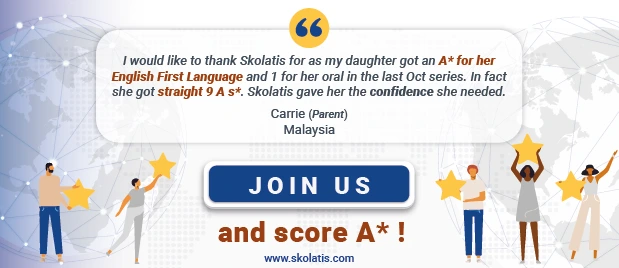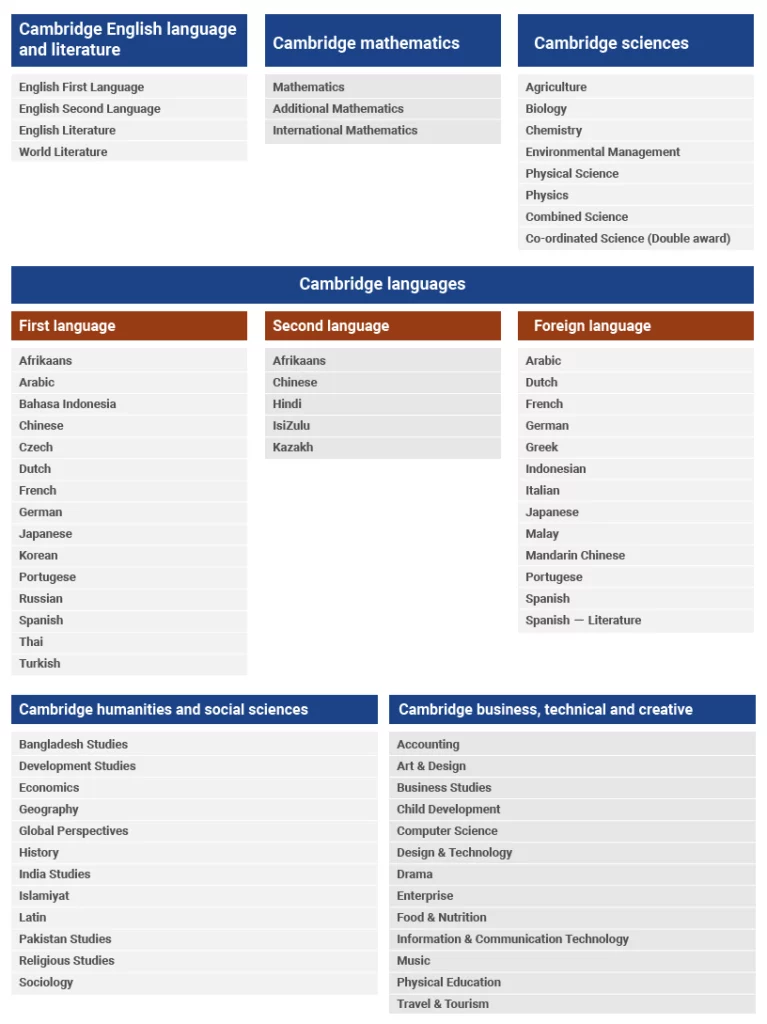
Descriptive vs Narrative Essays
The IGCSE English First Language exam places a strong emphasis on creative writing, with writing descriptive and narrative essays being

Announcement: Cambridge IGCSE, and AS & A Level November 2024 past papers are now available.
Announcement:
Cambridge International Education no longer be an Ofqual-recognised awarding organisation from December 20, 2024.
Cambridge IGCSE is offered by the University of Cambridge International Examinations (CIE), a division of Cambridge Assessment, a department of the University of Cambridge. It is an internationally recognised qualification for students in the 14 to 16 age group.
IGCSE stands for International General Certificate of Secondary Education. Edexcel is another international examination board which offers IGCSE. Read more about what is IGCSE and the comparison between Edexcel and Cambridge’s IGCSE.
Many universities worldwide require a combination of Cambridge International A Levels and Cambridge IGCSEs to meet their entry requirements. For example, leading US and Canadian universities require Cambridge International AS & A Levels, but some US and Canadian colleges and universities will accept learners with five Cambridge IGCSEs at grade C or above.
In the UK, Cambridge IGCSE is accepted as equivalent to the GCSE. Many UK universities look at Cambridge IGCSE grades, as well as predicted grades for Cambridge International A Level, when making admissions decisions.
IGCSE is also popular among homeschoolers, and adult students. Students typically take IGCSE in the age group of 14-16, or 15-17 depending on primary 1 entry age. On the other hand, students from alternative education, or even adult students, are taking IGCSE as a form of personal education advancement.
Some homeschooling educators in the US are choosing IGCSE as oppose to the standard American high school curriculums, because it is said to be a year (or more) advanced than the standard American high school course.

Cambridge IGCSE offers more than 70 subjects. Students are required to take a minimum of 5 or maximum of 14 subjects.
The core subjects are English, Mathematics and Sciences. Students can also choose other subjects ranging from Social Sciences (commonly Accounting, Business Studies, Economics, Sociology) to Arts & Technology (commonly Computer Studies, Information & Communication Technology (ICT), Art & Design).
Student is awarded with one IGCSE certificate on each subject. For example, you will obtain 5 IGCSE certificates, if you take 5 subjects. Each school decides upon the number of compulsory subjects differently. However, a private candidate may decides based on individual preference.
Cambridge IGCSE subjects is divided into 6 main subject groups. Each group contains several subjects which learners can choose from, in order to fulfil the minimum required subjects.

Cambridge IGCSE syllabus is regularly updated and extended, on a yearly or every 2-year basis. Due to the constant changes, it has become a great challenge for learners, parents and teachers to catch up with the latest exam syllabus. Therefore, keeping an updated exam syllabus is crucial, to ensure you are learning with the right exam topics.
Example incident:
A teacher in a private school in the UK was not aware of the change of syllabus for English First Language. We managed to assist her with the new exam syllabus just 2 months prior to the exams.
Each subject’s syllabus is further divided into Core and Extended curriculum.
I’ve learned advanced things much faster than a teacher could have taught me
“I am really enjoying Skolatis! It is very helpful. I feel that the way you teach the subjects are very helpful and aid in helping people learn more complicated things. For example I’m a lot ahead in chemistry and biology. I’ve learned many more advanced things much faster than a teacher could have taught me it. Skolatis has really helped me improve in chemistry and biology.”
~ James Armenis (Greece)
To take account of differing abilities, there is a choice between Core and Extended curriculum papers in most subjects. Hence, this allows teachers to decide on the most appropriate level of exam entries for their students.
The Core curriculum in each subject is within the ability range of a large majority of students. Therefore, it provides a full overview of the subject and the highest grade the students can achieve is grade C.
The Extended curriculum comprises the Core curriculum and the Supplement. It has extra topics and more depth. The highest grade the students can achieve is grade A*.
Since exam entry is based on the teacher’s prediction, the teacher may predict the student is unable to achieve grade A* by registering the student in Core curriculum. There have been several disputes happening worldwide between students’ desire to score A* and teachers’ lower prediction.
Here is one of the many SOS messages we received:
“I actually I want to study medicine. So u know that universities needed grades like A* TO B. but I knew the core grade’s maximum, so I shocked to hear that. If you imagine that I got the grade C but it is not related to the university requirements so it is not possible to enter to my dream careeer. I also paid the fees for the IGCSE exam. Our school, also didn’t explained that clearer. Ok, So is there any ways to change the curriculum from core to extended. Any way or method (suggestion from you) “
| Target Grades | Grades Available |
| Core Curriculum | C D E F G |
| Extended Curriculum | A* A B C D E |
The overlap of three grades (C, D and E) is designed to accommodate students who perform either better or worse than their teachers expect. Students who fail to meet the minimum satisfactory standard for either the Core curriculum (Grade G) or the Extended curriculum (Grade E) will be ungraded.
In a few subjects, the examination covers the complete ability range and there is no choice of curriculum. For these subjects, the full range of grades is available.
* If you need help in deciding between “Core” and “Extended”, just leave us a question at the comment box below. We are more than happy to assist you.
Assessment for IGCSE is primarily based on final exams, although some subjects may include coursework components.
Examinations are taken at the end of a two-year course of study, typically in May/June or October/November.
Assessment methods can include written papers, oral and practical tests, and coursework, depending on the subject.
Cambridge IGCSE results usually will be released in August for June series, and in January for November series. Whereas for March series, result usually is released in May.
The IGCSE is graded from A* to G, with U stated as “Ungraded”. In order to proceed to further education, students need to obtain minimum grade C for the 5 core subjects. IGCSE grading overview is as below:
| IGCSE Grade | US Grade | Equivalent GPA |
|---|---|---|
| A* | A or N/A | 4.0 or 4.3 (Weighted) |
| A | A | 4.0 |
| B | A- | 3.7 |
| C | B | 3.0 |
| D | C+ | 2.3 |
| E | C | 2.0 |
| F | D+ | 1.3 |
| G | D | 1.0 |
| U | E/F | 0.0 (IGCSE Ungraded) |
Read more on how are IGCSE results reported. Understand what does “Ungraded”, “Pending / Q”, “No Result” etc. mean on your report card.
The Cambridge ICE certificate is a group award. Therefore, schools which offer a broad curriculum will often adopt this group award. Candidates enter and sit for a minimum of seven subjects selected from the five IGCSE curriculum areas:
Candidates who pass in at least 7 (seven) Cambridge IGCSE subjects, including two from Group 1 and one from each of Groups 2 to 5, will earn the Cambridge ICE award. The seventh subject may be chosen from any of the syllabus groups.
In order to gain the Cambridge ICE award, candidates must make the exam entries indicating Cambridge ICE award.
Candidates who qualify for the Cambridge ICE award will be placed in one of three categories:

Our valuable A* resources had produced thousands of A* scorers around the world. Check them out below.
Our internationally loved exam model answers had helped thousands of students in scoring A/A*. Schools and teachers worldwide have used these resources to aid in their teachings. Learn what an A* answer like, copy the style and score A* in your exam.
Our word-renowned IGCSE and AS/A Level courses had produced more than 1100 A/A* scorers worldwide. They are suitable for schooled or home-schooled candidates, and as full course or revision course.
We have the most complete past exam papers library on earth (no kidding!). Choose your exam board and download everything with one click.
Get the latest exam syllabus and plan your study accordingly.
Find out the exam registration and results released key dates for IGCSE and AS/A Level.
Check your administrative zone, the exam dates and time. For both IGCSE and AS/A Level.
Find and locate the nearest exam centre for your location.
Please kindly read the IGCSE FAQs here.
Note: CIE (Cambridge International Examination board) has its name changed to CAIE (Cambridge Assessment International Education) since October 2017.
In October 2023, CAIE updated its name, logo, look, and messaging. Cambridge International Education is the new name of the awarding body of Cambridge University Press & Assessment. This name will be used on materials related to administering exams and awarding qualifications.
Join 60,657 (and counting) IGCSE & AS/A Level subscribers who've taken our insanely valuable FREE email courses. Learn exam tips & score A* in your exam!
Join 60,657 (and counting) IGCSE & AS/A Level subscribers who’ve taken our insanely valuable FREE email courses. Learn exam tips & score A* in your exam!
Abhishek Bathina
Abhishek Bathina
Raunaq Nambiar
Raunaq Nambiar
Jyoti
Jyoti
Soham Santra
Soham Santra
Yusra
India
Yusra
India
Christina Theosabrata
Christina Theosabrata
Harsh Aryan
Harsh Aryan
Akshit Philip
Bahrain
Akshit Philip
Bahrain
Eva Muthusamy
Malaysia
Eva Muthusamy
Malaysia
Lanja Omer
United Arab Emirates
Lanja Omer
United Arab Emirates

The IGCSE English First Language exam places a strong emphasis on creative writing, with writing descriptive and narrative essays being

In the IGCSE English First Language Directed Writing task, you’ll be required to either write a speech, letter, or article

In Chemistry, writing a balanced chemical equation is a skill that needs practice. This article will discuss all the tips

In the face of violence and uncertainty, education stands as a beacon of hope, offering students the tools to navigate

Our best-selling exam essentials.

.